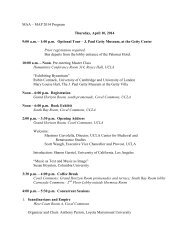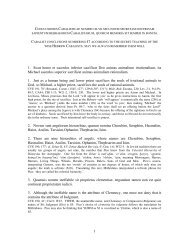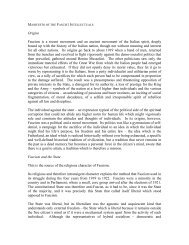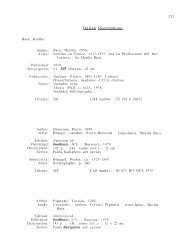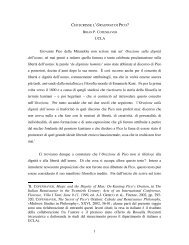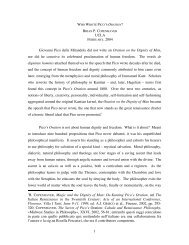1 (1) Pythagoras of Samos instructed the region of Italy once called ...
1 (1) Pythagoras of Samos instructed the region of Italy once called ...
1 (1) Pythagoras of Samos instructed the region of Italy once called ...
Create successful ePaper yourself
Turn your PDF publications into a flip-book with our unique Google optimized e-Paper software.
This is <strong>the</strong> complaint <strong>of</strong> Philippus: that <strong>the</strong>re were not “two thousand men in <strong>the</strong> state<br />
who had a thing.” 47 Sometimes <strong>the</strong> point is utility, as in ‘it’s <strong>the</strong> thing’ or ‘it’s just your<br />
thing,’ (21) and sometimes <strong>the</strong> question is what <strong>the</strong> question is (which pertains to <strong>the</strong> next<br />
book, however), as in Cicero’s work On <strong>the</strong> Laws: “Is <strong>the</strong>re such dissension about just<br />
one thing, which is what is actually ‘pertinent to <strong>the</strong> thing’?” 48 And it is no wonder that<br />
one word has so many special meanings since it includes <strong>the</strong>m all comprehensively.<br />
(22) ‘Thing’ works better (I feel) than <strong>the</strong> Greek ‘pragma,’ which is usually translated as<br />
‘action,’ though we too sometimes say ‘action’ for ‘thing,’ as Cicero does in <strong>the</strong> Rhetoric<br />
when he states that arguments derive from what is alleged ei<strong>the</strong>r <strong>of</strong> ‘persons’ or <strong>of</strong><br />
‘actions,’ and Sallust likewise in <strong>the</strong> Jugurthine War: “Every authority transfers his own<br />
guilt to <strong>the</strong> actions <strong>of</strong> o<strong>the</strong>rs.” 49 This may be what Ulpian means: “it was actually<br />
established in <strong>the</strong> nature <strong>of</strong> things that <strong>the</strong>re are more actions than words.” 50 And this<br />
may also have been <strong>the</strong> reason why Aristotle wanted to use ‘to on’ more <strong>of</strong>ten than<br />
‘pragma,’ though he would have used ‘pragma’ ra<strong>the</strong>r than ‘to on’ had he attended to <strong>the</strong><br />
character and meaning <strong>of</strong> <strong>the</strong> words. 51<br />
(23) I have had much to say <strong>of</strong> <strong>the</strong> first three terms, which are almost <strong>the</strong> same in<br />
character. I shall also discuss <strong>the</strong> o<strong>the</strong>r three, which have different features, treating <strong>the</strong>m<br />
as honored guests and not discharging <strong>the</strong>m dishonorably – all <strong>the</strong> more since we would<br />
seem to insult those to whom we have denied <strong>the</strong> rank <strong>of</strong> transcendental. But no one who<br />
fairly denies someone a greater honor causes him insult, though perhaps it would be fair<br />
for me to allow more because I have seemed to put <strong>the</strong>m on <strong>the</strong> same level with<br />
‘something,’ <strong>the</strong> term that contrasts with nothing but ‘nothing’ itself. (24) ‘Many’<br />
contrasts with ‘one,’ however, and ‘evil’ with ‘good’ and ‘false’ with ‘true,’ which<br />
<strong>the</strong>mselves are ‘something.’ ‘One’ occurs as ‘one thing,’ moreover, as in ‘just one I seek<br />
from you, judges.’ I hardly dare say that ‘good’ is taken’ as ‘good thing’ since we read<br />
that ‘all aim at <strong>the</strong> good.’ 52 ‘True’ for ‘true thing’ I do not recall finding, but it is used for<br />
‘truth,’ as ‘false’ is used for ‘falsity’ – likewise, ‘good’ for ‘goodness,’ ‘evil’ for<br />
‘wickedness’ and, yes, ‘one’ for ‘unity’ (or actually for ‘one thing’) as in ‘from one to a<br />
hundred.’<br />
(25) Aristotle claims that one is not a number but <strong>the</strong> ‘beginning’ <strong>of</strong> number, as if<br />
beginnings <strong>of</strong> things were not parts <strong>of</strong> those same things but, consequently, things in<br />
<strong>the</strong>mselves. 53 Someone who reads <strong>the</strong> beginning <strong>of</strong> a book reads a book; someone who<br />
touches a person’s head touches a person; someone who sees <strong>the</strong> beginning <strong>of</strong> a swamp<br />
sees a swamp. These facts must be ascribed not to <strong>the</strong> chicanery <strong>of</strong> sophists but to <strong>the</strong><br />
47<br />
Cic. Off. 2.73: Cicero describes Lucius Marcius Philippus, consul in 91 and a great orator, who made this<br />
remark in defending an agrarian law.<br />
48<br />
Cic. Leg. 1.53-4: <strong>the</strong> text <strong>of</strong> Cicero’s Laws that Valla cites is corrupt, but <strong>the</strong> sense <strong>of</strong> ‘res’ is <strong>the</strong> same.<br />
49<br />
Zippel cites Cic. Rhet. Her. 2.1; Sall. Jug. 1.<br />
50<br />
Dig. 19.5.4: Ulpian is thinking <strong>of</strong> legal transactions ra<strong>the</strong>r than actions in general, and <strong>the</strong> former is closer<br />
to ‘negotium.’<br />
51<br />
In fact, pragma is more common than to on in Aristotle, but its range is broader.<br />
52 a<br />
Valla alludes to <strong>the</strong> famous opening <strong>of</strong> <strong>the</strong> Nicomachaean Ethics: Arist. EN 1094 1-3.<br />
53 Arist. Meta. 1052b23-4; 1088 a 6-7.<br />
12<br />
2/21/05 9:35 PM 12/44



